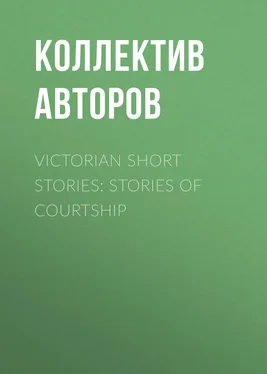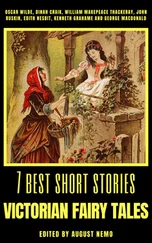Коллектив авторов - Victorian Short Stories - Stories of Courtship
Здесь есть возможность читать онлайн «Коллектив авторов - Victorian Short Stories - Stories of Courtship» — ознакомительный отрывок электронной книги совершенно бесплатно, а после прочтения отрывка купить полную версию. В некоторых случаях можно слушать аудио, скачать через торрент в формате fb2 и присутствует краткое содержание. Жанр: foreign_prose, foreign_antique, на английском языке. Описание произведения, (предисловие) а так же отзывы посетителей доступны на портале библиотеки ЛибКат.
- Название:Victorian Short Stories: Stories of Courtship
- Автор:
- Жанр:
- Год:неизвестен
- ISBN:нет данных
- Рейтинг книги:3 / 5. Голосов: 1
-
Избранное:Добавить в избранное
- Отзывы:
-
Ваша оценка:
- 60
- 1
- 2
- 3
- 4
- 5
Victorian Short Stories: Stories of Courtship: краткое содержание, описание и аннотация
Предлагаем к чтению аннотацию, описание, краткое содержание или предисловие (зависит от того, что написал сам автор книги «Victorian Short Stories: Stories of Courtship»). Если вы не нашли необходимую информацию о книге — напишите в комментариях, мы постараемся отыскать её.
Victorian Short Stories: Stories of Courtship — читать онлайн ознакомительный отрывок
Ниже представлен текст книги, разбитый по страницам. Система сохранения места последней прочитанной страницы, позволяет с удобством читать онлайн бесплатно книгу «Victorian Short Stories: Stories of Courtship», без необходимости каждый раз заново искать на чём Вы остановились. Поставьте закладку, и сможете в любой момент перейти на страницу, на которой закончили чтение.
Интервал:
Закладка:
'I can't say that I do,' said the Captain. At the same time the Captain did remember very well what those last words had been.
'I am so glad to see you, so delighted to see you, if—if—if—,' and then she paused, for with all her courage she hardly dared to ask her nephew whether he had come there with the express purport of asking Miss Woolsworthy to marry him.
To tell the truth—for there is no room for mystery within the limits of this short story,—to tell, I say, at a word the plain and simple truth, Captain Broughton had already asked that question. On the day before he left Oxney Colne he had in set terms proposed to the parson's daughter, and indeed the words, the hot and frequent words, which previously to that had fallen like sweetest honey into the ears of Patience Woolsworthy, had made it imperative on him to do so. When a man in such a place as that has talked to a girl of love day after day, must not he talk of it to some definite purpose on the day on which he leaves her? Or if he do not, must he not submit to be regarded as false, selfish, and almost fraudulent? Captain Broughton, however, had asked the question honestly and truly. He had done so honestly and truly, but in words, or, perhaps, simply with a tone, that had hardly sufficed to satisfy the proud spirit of the girl he loved. She by that time had confessed to herself that she loved him with all her heart; but she had made no such confession to him. To him she had spoken no word, granted no favour, that any lover might rightfully regard as a token of love returned. She had listened to him as he spoke, and bade him keep such sayings for the drawing-rooms of his fashionable friends. Then he had spoken out and had asked for that hand,—not, perhaps, as a suitor tremulous with hope,—but as a rich man who knows that he can command that which he desires to purchase.
'You should think more of this,' she had said to him at last. 'If you would really have me for your wife, it will not be much to you to return here again when time for thinking of it shall have passed by.' With these words she had dismissed him, and now he had again come back to Oxney Colne. But still she would not place herself at the window to look for him, nor dress herself in other than her simple morning country dress, nor omit one item of her daily work. If he wished to take her at all, he should wish to take her as she really was, in her plain country life, but he should take her also with full observance of all those privileges which maidens are allowed to claim from their lovers. He should curtail no ceremonious observance because she was the daughter of a poor country parson who would come to him without a shilling, whereas he stood high in the world's books. He had asked her to give him all that she had, and that all she was ready to give, without stint. But the gift must be valued before it could be given or received. He also was to give her as much, and she would accept it as being beyond all price. But she would not allow that that which was offered to her was in any degree the more precious because of his outward worldly standing.
She would not pretend to herself that she thought he would come to her that afternoon, and therefore she busied herself in the kitchen and about the house, giving directions to her two maids as though the day would pass as all other days did pass in that household. They usually dined at four, and she rarely, in these summer months, went far from the house before that hour. At four precisely she sat down with her father, and then said that she was going up as far as Helpholme after dinner. Helpholme was a solitary farmhouse in another parish, on the border of the moor, and Mr. Woolsworthy asked her whether he should accompany her.
'Do, papa,' she said, 'if you are not too tired.' And yet she had thought how probable it might be that she should meet John Broughton on her walk. And so it was arranged; but, just as dinner was over, Mr. Woolsworthy remembered himself.
'Gracious me,' he said, 'how my memory is going! Gribbles, from Ivybridge, and old John Poulter, from Bovey, are coming to meet here by appointment. You can't put Helpholme off till tomorrow?'
Patience, however, never put off anything, and therefore at six o'clock, when her father had finished his slender modicum of toddy, she tied on her hat and went on her walk. She started forth with a quick step, and left no word to say by which route she would go. As she passed up along the little lane which led towards Oxney Colne she would not even look to see if he was coming towards her; and when she left the road, passing over a stone stile into a little path which ran first through the upland fields, and then across the moor ground towards Helpholme, she did not look back once, or listen for his coming step.
She paid her visit, remaining upwards of an hour with the old bedridden mother of the farmer of Helpholme. 'God bless you, my darling!' said the old lady as she left her; 'and send you someone to make your own path bright and happy through the world.' These words were still ringing in her ears with all their significance as she saw John Broughton waiting for her at the first stile which she had to pass after leaving the farmer's haggard.
'Patty,' he said, as he took her hand, and held it close within both his own, 'what a chase I have had after you!'
'And who asked you, Captain Broughton?' she answered, smiling. 'If the journey was too much for your poor London strength, could you not have waited till tomorrow morning, when you would have found me at the parsonage?' But she did not draw her hand away from him, or in any way pretend that he had not a right to accost her as a lover.
'No, I could not wait. I am more eager to see those I love than you seem to be.'
'How do you know whom I love, or how eager I might be to see them? There is an old woman there whom I love, and I have thought nothing of this walk with the object of seeing her.' And now, slowly drawing her hand away from him, she pointed to the farmhouse which she had left.
'Patty,' he said, after a minute's pause, during which she had looked full into his face with all the force of her bright eyes; 'I have come from London today, straight down here to Oxney, and from my aunt's house close upon your footsteps after you to ask you that one question. Do you love me?'
'What a Hercules?' she said, again laughing. 'Do you really mean that you left London only this morning? Why, you must have been five hours in a railway carriage and two in a post-chaise, not to talk of the walk afterwards. You ought to take more care of yourself, Captain Broughton!'
He would have been angry with her,—for he did not like to be quizzed,—had she not put her hand on his arm as she spoke, and the softness of her touch had redeemed the offence of her words.
'All that have I done,' said he, 'that I may hear one word from you.'
'That any word of mine should have such potency! But, let us walk on, or my father will take us for some of the standing stones of the moor. How have you found your aunt? If you only knew the cares that have sat on her dear shoulders for the last week past, in order that your high mightyness might have a sufficiency to eat and drink in these desolate half-starved regions.'
'She might have saved herself such anxiety. No one can care less for such things than I do.'
'And yet I think I have heard you boast of the cook of your club.' And then again there was silence for a minute or two.
'Patty,' said he, stopping again in the path; 'answer my question. I have a right to demand an answer. Do you love me?'
'And what if I do? What if I have been so silly as to allow your perfections to be too many for my weak heart? What then, Captain Broughton?'
'It cannot be that you love me, or you would not joke now.'
'Perhaps not, indeed,' she said. It seemed as though she were resolved not to yield an inch in her own humour. And then again they walked on.
Читать дальшеИнтервал:
Закладка:
Похожие книги на «Victorian Short Stories: Stories of Courtship»
Представляем Вашему вниманию похожие книги на «Victorian Short Stories: Stories of Courtship» списком для выбора. Мы отобрали схожую по названию и смыслу литературу в надежде предоставить читателям больше вариантов отыскать новые, интересные, ещё непрочитанные произведения.
Обсуждение, отзывы о книге «Victorian Short Stories: Stories of Courtship» и просто собственные мнения читателей. Оставьте ваши комментарии, напишите, что Вы думаете о произведении, его смысле или главных героях. Укажите что конкретно понравилось, а что нет, и почему Вы так считаете.

![Коллектив авторов - Best Short Stories [С англо-русским словарем]](/books/26635/kollektiv-avtorov-best-short-stories-s-anglo-thumb.webp)










